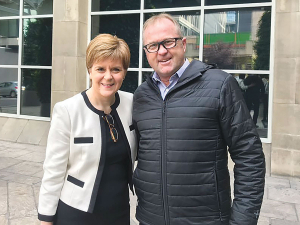New Order
OPINION: If old Winston Peters thinks building trade relations with new nations, such as India, isn't a necessary investment in our future, he has rocks in his head.
 NZ Special Agriculture Trade Envoy Mike Petersen pictured with the First Minister of Scotland Nicola Sturgeon.
NZ Special Agriculture Trade Envoy Mike Petersen pictured with the First Minister of Scotland Nicola Sturgeon.
The escalating trade war between the US and China will impact NZ trade, warns special agricultural trade envoy Mike Petersen.
He says it no longer rings true that, as some New Zealanders are saying, there’s nothing to worry about because the trade war is between two world super powers.
“Yes, it is directly between the US and China and yes, generally we are sliding under the radar and managing to grow our international trading opportunities as we speak,” he told the recent DairyNZ Farmers Forum in Rotorua.
“Just remember all these things have consequences.”
Petersen points to President Donald Trump’s recent decision to offer US$16 billion aid to farmers affected by retaliatory tariffs imposed by China.
“President Trump says farmers are struggling under the tariff war that he started.
“Hey, this is everything that’s wrong in the world of international trade. I call it aid for a self inflicted wound.”
The US is beginning to be flooded with farm produce as Chinese retaliatory tariffs begin to bite. For example, the Trump administration is buying milk from farmers and putting it into aid programmes.
“President Trump thinks he is going to solve the world’s hunger problems by buying milk off their farmers and dumping it in international markets,” says Petersen.
Export of US soy to China has almost ground to a halt, Petersen notes.
“Where is that soy going now? It is being dumped on the livestock feed market to produce more milk. The US is one of the few areas actually growing its supply of milk largely on the back of cheap feed.
“All these things have consequences and we need to work really hard in NZ to try to make sure we remain relevant in this world where these geopolitical powers are having massive games around trade.”
Petersen urged maintaining close trade ties with China and said the recent visit by Prime Minister Jacinda Ardern and a subsequent trade delegation led by Trade Minister David Parker have helped.
He also said the dairy sector can create more value without increasing herd sizes.
“We have a fixed amount of land and there’s growing environmental pressure. It’s not about more animals but more value and more profit from what we are doing today.”
Petersen brushed off concerns about plant based proteins.
“I’m not concerned about plant based proteins. Let’s focus on ourselves rather than the opponents -- as the All Blacks do.”
Budou are being picked now in Bridge Pā, the most intense and exciting time of the year for the Greencollar team – and the harvest of the finest eating grapes is weeks earlier than expected.
The Real Estate Institute of New Zealand (REINZ) has released its latest rural property report, providing a detailed view of New Zealand’s rural real estate market for the 12 months ending December 2025.
Rural retailer Farmlands has released it's latest round of half-year results, labeling it as evidence that its five-year strategy is delivering on financial performance and better value for members.
OPINION: "We are back to where we were a year ago," according to a leading banking analyst in the UK, referring to US president Donald Trump's latest imposition of a global 10% tariff on all exports into the US.
DairyNZ says the Government’s proposed Resource Management Act reform needs further work to ensure it delivers on its intent.
Overseas Trade Minister Todd McClay says he's working constructively with the Labour Party in the hope they will endorse the free trade agreement (FTA) with India when the agreement comes before Parliament for ratification.